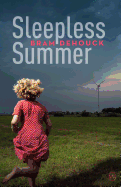
In Bram Dehouck's Sleepless Summer, the arrival of a wind farm near the tiny Belgian town of Blaashoek precipitates a series of disturbing events. The novel--translated by Jonathan Reeder--might loosely be considered a crime novel or thriller, but it also has firm roots in horror. There is something Edgar Allan Poe-like in the inexplicable way the wind turbines tax some of Blaashoek's inhabitants, especially Herman Bracke, a butcher who blames his insomnia on an irritating hum coming from the turbines. As his insomnia continues, his fatigue worsens, eventually setting of a chain of events that progress from gross and odd to horrific.
Bracke is only one character out of more than a dozen efficiently sketched by the author in fewer than 200 pages. Dehouck pays particular attention to each one's fears, resentments and insecurities, which provide the fissile material for the town's collapse into chaos. He is merciless in uncovering the status anxiety and prejudices endemic in Blaashoek. Still, Sleepless Summer resists interpretation as an indictment of small-minded, provincial thinking. In fact, Dehouck seems to mock high-minded interpretations at the start of the novel: "Immediately following the tragic events, sociologists and psychologists scrambled to pinpoint the cause of this human cataclysm. Loneliness, cried one. Alienation, bellowed the next. Small-town insularity, opined the third. It was only a matter of time before a fourth would come up with inbreeding." The depths Sleepless Summers reaches are all the more disturbing if they cannot be explained away. It is determined to leave you with a sick feeling in the pit of your stomach. --Hank Stephenson, bookseller, Flyleaf Books, Chapel Hill, N.C.

